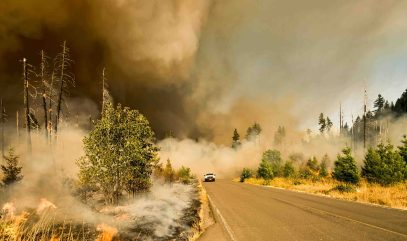Fighting Spokane's Food Crisis
If you have it, you don’t think much about it. If you don’t have it, it’s all you think about.
The U.S. has a huge problem with food; one in every nine Americans currently struggle with hunger, many of whom are children. Our country’s safety net is also notoriously shallow, forcing some to choose between rent or groceries during rocky times. This doesn’t mean that we don’t have enough food – we waste 40% of all food produced. It means it’s just not going to the right people.
Spokane County is no exception, with 14% of residents and 20% of children being food-insecure. Food insecurity, defined by Second Harvest, means that a person does not know where their next meal will come from. With the huge rise of unemployment from the pandemic, even more people are facing hunger alongside bills, healthcare costs, and growing anxieties from ongoing uncertainty.
With the large number of nonprofits dedicated to solving hunger, you would think that we’d be making great progress toward food security. Second Harvest, Meals on Wheels, and Spokane Food Fighters are all local groups dedicated to increasing access to food in our communities. Government aid is also available for certain circumstances. Children get affordable or free lunches and breakfasts at school, and food stamps are available to support families. It seems like a promising safeguard, but it’s missing something. It’s missing businesses.
B Corps believe that “society’s most challenging problems cannot be solved by government and nonprofits alone”. It takes people, and therefore the businesses owned by those people, to promote structural change. Businesses can be the final liaison between food security and their communities.
There are so many nuances when it comes to food insecurity, which also means that a business can help wherever they fit best. The following are some ways purpose-driven businesses have helped increase food security:
Tricycle Gardens and Food Deserts
One issue is the prevalence of food deserts. Food deserts are communities located a mile or further away from a grocery store. Though they don’t have any stores selling fresh produce, they are crowded with corner stores. The corner stores sell cheap, pre-packaged foods like chips and candy. For many of the community’s residents, this is the only place they can buy food without taking a forty-minute bus ride or walking over a mile. Some more privileged residents can afford the time or means needed for transportation, but to most it’s too easy to settle for pre-packaged or fast food. Grocery stores refuse to move in because they perceive that communities can’t afford to buy their food. The cycle continues, leading to generations of health problems plaguing already vulnerable populations.
Tricycle Gardens, an urban farm from Richmond, VA, neighbors a food desert. They understood much of their food was not going to the people that needed it most. They created a program called the “Healthy Corner Store Initiative,” in which they partner with corner stores to sell their produce. The farm delivers produce to the store, tracks sales, and answers customer questions. Knowing that some may have never tried or cooked with certain kinds of produce, the farm also offers free samples and recipe ideas. It may not be a long-term solution, but their initiative creates an accessible way for residents to buy fresh food.
Goodr and Food Waste
Farms aren’t the only ones that can fight against hunger – the tech industry can too. Goodr is a Black, woman-owned B Corp that “tracks an organization’s surplus food from pickup to donation, delivering real-time social and environmental impact reporting analytics,” according to their website. They believe that they can fight hunger by reducing food waste at a corporate level. When more food is available, more of it can go to the people who need it.
Goodr forges a symbiotic relationship for businesses and their communities. Many companies want to reduce costs and waste. Along the way, they also can provide food for people who need it. Fighting hunger also combats global warming – excess food in landfills emits large amounts of GHGs over their lifetime. Businesses like Goodr are absolutely necessary to ensure food security throughout our world.
How can your business be a force for good in the fight against food insecurity?
Read More
The 1980s Called and They Want Their Business Case Back: Why we're rejecting the "business case" for sustainability
They say a rising tide raises all boats. But there isn’t any raising to be done when the tide no longer comes into the bay – all boats remain stranded. We are often asked about the business case for sustainability. For y
Protect Your Community or Organization with a Climate Action Plan
Introduction Our changing climate impacts every aspect of our lives—our economy, our communities, and the environment—in ways both visible and unseen. While scientists and environmental organizations have long recognized
Witnessing the world of sustainable business firsthand
As a young student with a passion for climate justice and sustainability, it always felt like a contradiction to pursue a degree in business. From what I had witnessed, businesses didn’t necessarily operate ethically. Mu
Interning with Purpose: My Journey with Measure Meant
From January to May 2024, I had the distinct pleasure of working with Measure Meant as an Operations Intern. As a graduating senior at Gonzaga University, I had not planned on pursuing another internship in my final seme




